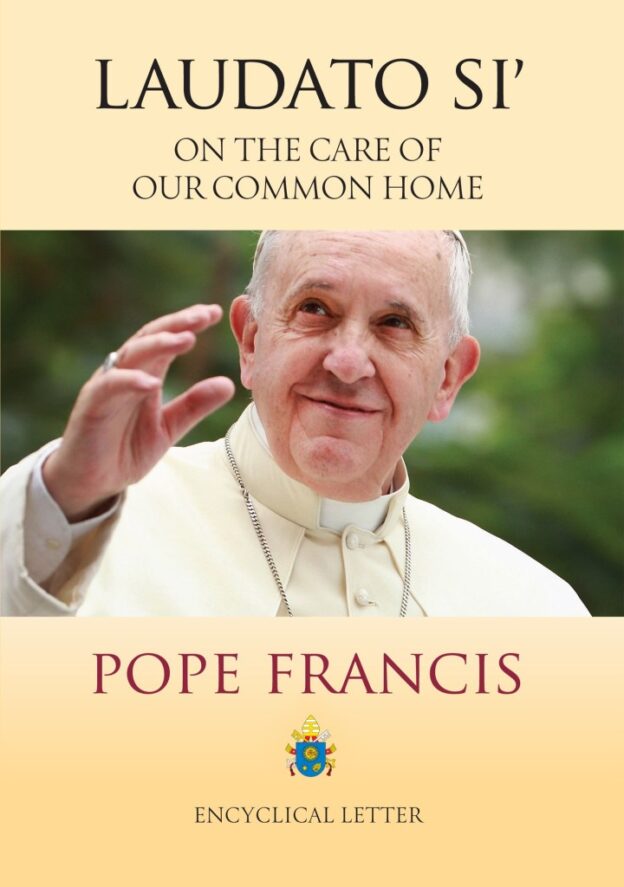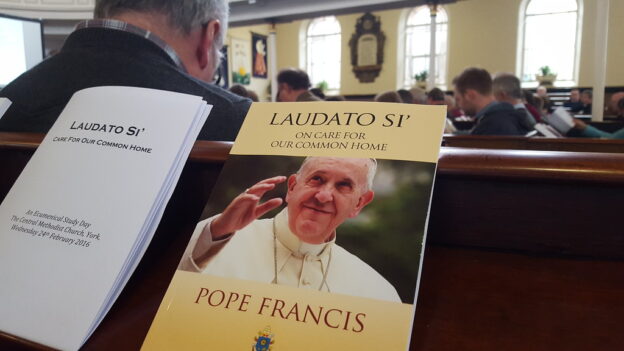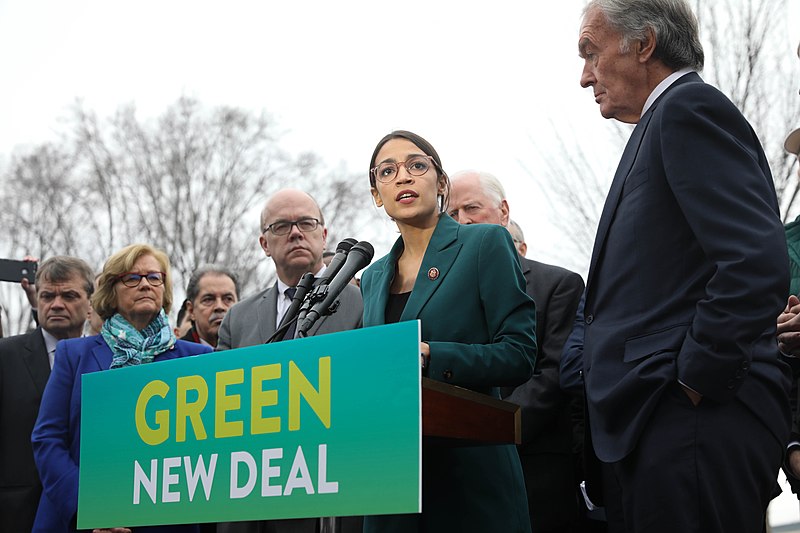Core text
Pope Francis. Encyclical Letter Laudato Si’ of the Holy Father Francis on Care for Our Common Home. The Holy See: Vatican Press, 2015. The Holy See.
Summary
The urgent need to preserve our planet has emerged as an issue of science, politics, economics, justice — and morality, as evidenced by Pope Francis’ 2015 publication of Laudato Si’: On Care for Our Common Home. The title of the encyclical comes from the pope’s namesake, St. Francis of Assisi. “Laudato Si’” means “Praise be to you Lord,” from the beginning of a prayer of St. Francis that continues, “through our Sister, Mother Earth, who sustains and governs us, and who produces various fruit with colored flowers and herbs.”
While Francis joins leaders of many other faiths — including his own predecessors — in defining environmental concerns as moral concerns, publishing an encyclical addressed to the world elevates and develops these concerns in an unprecedented way. In doing so, he defines environmental degradation and social degradation are inextricable.
Laudato Si‘ is more than a call to lower carbon emissions. In fact, Francis calls the buying and selling of carbon credits “a quick and easy solution” (if only it were quick and easy in the United States) that does not allow for the radical change these circumstances require. Instead, Laudato Si’ is a call to change the way we live: to decrease consumption, to be in solidarity with future generations, and to value every creature. The current pace of consumption and waste, of extreme consumerism, is not sustainable.
So, too, is unrestrained capitalism. As if writing directly to the United States, Pope Francis says that our current economic model is too rooted in individual success and self-reliance. He links the mindset of those who lack concern for the most vulnerable of society with the mindset of those who have no concern for the environment. He devotes an entire section to global inequality, reminding us that the environmental deterioration will affect the world’s most vulnerable people.
The message of Laudato Si’ will be familiar to those on the frontlines of the environmental movement: Extreme consumerism has led to a grave environmental crisis, and human beings need to change their lives radically to solve this crisis.
Teaching resources
- Klein, Naomi. “A Radical Vatican?” The New Yorker, 10 July 2015.
This essay in The New Yorker — also a chapter in Klein’s On Fire: The Burning Case for the Green New Deal — tells the story of her trip to the Vatican to participate in the announcement of the publication of Laudato Si’. A self-described “secular Jewish feminist” Klein describes the juxtaposition of her presence against the male hierarchy, though she describes many of the Catholics present as either from the Global South — with a different perspective from that which has dominated Christianity for centuries — or those who have felt like exiles under previous popes. When asked in a press conference to address the juxtaposition, Klein responds that she is not present to negotiate a peace deal, but that if she and Pope Francis are correct that responding to climate change requires fundamental change to our economic model, then it will take an extraordinarily broad-based movement to demand those changes. Klein questions how Francis can on one hand understand the gravity of our current crisis and, on the other hand, be hopeful for the future — then realizing that if the Vatican itself, one of the most tradition-bound institutions in the world, could change as rapidly as it has under Francis, then perhaps that gives hope to the world.
- McDermott, Jim. “At the Front Lines: An Interview with California Governor Jerry Brown on ‘Laudato Si”.” America Magazine, 8 July 2015.
Former California Governor Jerry Brown has spent more than four decades in public service and has accomplished the feat of serving as California’s youngest governor (1975 to 1983) and oldest governor (2010 to 2018). A former Jesuit seminarian, he was interviewed in 2015 by the Jesuit weekly America regarding the intersection of Pope Francis’ Laudato Si’ and public policy. He speaks from the front lines of the fight against climate change — both with dealing with the effects of climate change (longer fire seasons) and combatting it (with policies that have succeeded in reducing carbon output despite an increase in population). The now-former governor acknowledges the tension between our reliance on amassing consumer goods and the pope’s words on the need to consume less. - Okpodu, Camellia Moses. “What It Will Take to Do the Work of Laudato Si’: Stewardship for All, by All.” National Catholic Reporter, 26 June 2020.
Part of a series in the National Catholic Reporter on the fifth anniversary of the publication of Laudato Si’, this piece reflects on Laudato Si’ from three unique perspectives: The author, Camellia Moses Okpodu, is an environmental scientist, she is African Methodist Episcopal, and she serves as dean of the College of Arts and Sciences at Xavier University of Louisiana, one of the nation’s 107 Historically Black Colleges and Universities. Okpodu explores the need to ensure that environmental programs in academia reach students of color, noting that environmental programs are lacking at HBCUs across the country. She has proposed a Centers for the Environment at colleges and universities serving minority students that would include students trained in the humanities and social and/or behavioral sciences, as well as the sciences. If people of color are to share the stewardship of caring for creation, Okpodu writes, we must make available the training it takes to do that work.
- Weber, Kerry. “Why ‘Laudato Si” Is the Perfect Encyclical for Millennials.” America Magazine, 18 June 2015.
This article — by a millennial who bought her copy of 50 Simple Things Kids Can Do to Save the Earth at age 8 — notes that Laudato Si’ addresses all of the primary concerns of the millennial generation, as reported by a Deloitte survey: unemployment, resource scarcity, climate change/protecting the environment and inequality. The encyclical recognizes the power of human connection, values ethnic and cultural diversity, appreciates innovation, offers a call to humility and urges greater efforts for equality and solidarity — all accessible to the generation that grew up with the 50 Simple Things series, Weber writes. Laudato Si’ was a needed reminder to this young writer that “our use of technology, love of the poor, and care for our environment are integrally connected, and that cultivating love and respect for all God’s creation is, in fact, a timely and timeless concern.”
Discussion Questions
- Quoting his predecessors, Pope Francis writes, “The Christian tradition has never recognized the right to private property as absolute or inviolable, and has stressed the social purpose of all forms of private property.” How has American individualism and the sacredness of private property rights contributed to environmental degradation? Is it even possible in this country to view private property rights as anything less than inviolable?
- Pope Francis also writes “Christian spirituality proposes a growth marked by moderation and the capacity to be happy with little. It is a return to that simplicity which allows us to stop and appreciate the small things, to be grateful for the opportunities which life affords us, to be spiritually detached from what we possess, and not to succumb to sadness for what we lack.” Could spirituality — of any faith or background — be a tool toward turning away from consumerism?
- More often than not in this country, many faith communities have been publically allied with politicians who do not support greater environmental protections. Is that changing? Is there a unique role that faith communities can play in combating environmental degradation?





